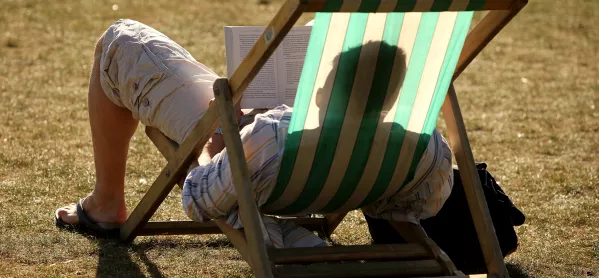Diet. It’s the first thing that we look to when the bathroom scales just can’t be right and those tight-ish trousers suddenly seem downright intrusive.
We know that if we want to become healthier, we have to put less of the bad stuff in - the Wotsits, the prosecco, the doughnuts - and eat more of what is good for us.
But what if it’s our mental, not physical, health, that we need to work on?
Quick read: Are great expectations destroying teacher wellbeing?
Quick listen: The truth about mental health in schools
Wellbeing ‘Teacher wellbeing isn’t about compulsory yoga and cakes’
With 31 per cent of teachers in 2018 claiming to have experienced a mental health issue in the past academic year alone, we need to be considering the role that mental diet plays in our overall wellbeing.
Shouldn’t we at least ask ourselves whether the information being fed into our minds, day after day, is feeding happiness or misery, resilience or anxiety?
Use the steps below to reflect on your own mental diet and see where healthy swaps can be made.
Teacher wellbeing: a breakfast of champions?
Consider your morning: what you’re watching and when you’re watching it. For years, I’d breakfast on the morning news, only to find that my commute to school was filled with thoughts of murder, animal cruelty and terrorism.
I told myself that, as a teacher, I needed to keep on top of current affairs, that I needed to know about relevant issues, that I might be able to effect change, somehow.
The only thing that changed, however, was the bleakening of my world view.
Healthy swap: If you sense that the news is adding to your misery, restrict your intake.
Try reading it on an app, instead of watching it - that way you can go into the stories that are relevant and read more, and avoid the things that are just going to aggravate and upset you.
And consider your time slot. Starting the day with Donald Trump and ending it with Brexit chaos doesn’t sound like a diet that would benefit anyone.
Mindless social media scrolling
Don’t underestimate the damage of passive scrolling: we all know that social media isn’t the most effective use of our time, but, just like the Wotsits, it tastes good and it’s easy to do mindlessly. But it’s bad for us.
Not only does it erode our attention muscles and our ability to control our own focus, it also subconsciously wears away at our self-esteem and wellbeing.
No matter how self-assured you might be, spending hours each week looking at pictures of other people’s fabulous, filtered lives and photo-shopped backsides is guaranteed to breed feelings of comparison and dissatisfaction.
Healthy swap: Get an app to see exactly how much time you’re spending scrolling, then do what you need to do to reduce it.
That mean deleting apps from your home screen, planning set times when your phone is face down and silent, or even - shock horror! - deactivating some accounts altogether.
Steer clear of suckers
Beware of emotional vampires; the miserable state of education right now means that schools have become breeding grounds for these poor, broken souls.
They stagger through the corridors, trapped in jobs that destroy them. They’re our comrades, our friends, our loved ones - they’re us. But they’re also incredibly draining to be around.
Healthy swap: If you know someone who is sinking in the quicksand, offer them the branch of help and support where you can, but know that jumping in alongside them won’t do either of you any good.
And, as harsh as it may seem, sometimes you need to avoid them. Protecting your own mental health is paramount.
Jo Steer is a teacher and experienced leader of special educational needs and disability interventions, as well as wellbeing strategies





